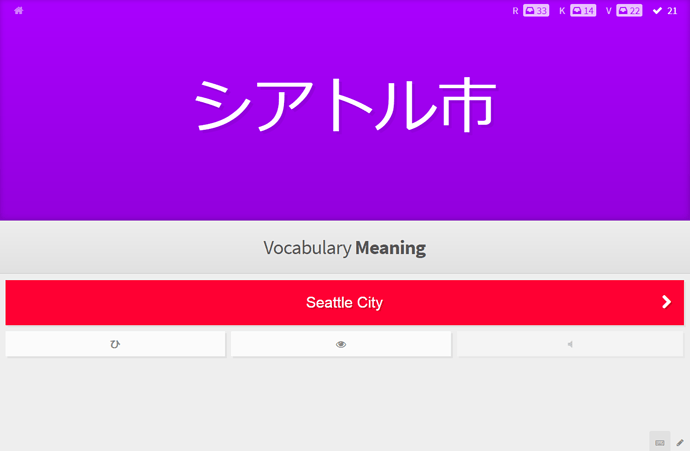While I was doing some reviews, one of the answers didn’t pass, however it was really correct. The expected answer was supposed to be Seattle, however my answer was “Seattle City” and the system didn’t like the answer at all and treated it as incorrect, however it really was correct, even the wording is consistent here. I still got penalty for it, interesting…
I believe you can add your own synonyms that way it won’t mark it wrong. You could also get the override script.
Literally just did that one right now. Luckily I typed in ‘Seattle’.
It isn’t correct, though, because the place isn’t called “Seattle City”, it is called “Seattle”
Wouldn’t it just be written as シアトル then? 市 doesn’t seem neccessary, and I don’t think Seattle is said as シアトル市 over シアトル - just like Seattle City isn’t said over Seattle.
I lived in Fujiyoshida, Japan, but when I say that place name in Japanese I say 富士吉田市. Japanese marks the places, English tends not to (Vatican City being a notable exception)
This is the exact point I was making here. You can choose any naming convention you want here. You can say “Seattle City” for clarification just as you can name any other city like “Washington City”
Interesting, yeah you would know more than me about that then. A quick question though: ニューヨーク is New York, but ニューヨーク市 is New York City. Why is this?
New York is a state and a city. Both are correct. You know, New York, New York, USA
I used to live near enough that we got reception for Seattle TV stations, and you really don’t hear anyone say that, though.
I do feel for you - I recently failed a vocab; the item had two alternatives, good luck and fortune, while my answer was good fortune.
The state would most likely have 州 after it to mark it as a state.
Interestingly, your profile picture of Mt Fuji looks like it was taken from the Fujiyoshida市 side!
Let’s put it this way- “City of Seattle” has the same meaning as you would say “Seattle City” in any instance and whatever level of correctness it contains. However let’s put this logic in “New York” example described above. You can say “New York” which most likely refers to the city, however you can say “New York City” for absolute clarification or “New York State” if you refer to the state. So… both instances are really correct
Yes, but since there is no other Seattle, as a state or other entity, it really doesn’t get called Seattle City.
As was already written, you can add it as a synonym if you want - I’m just explaining why the literal translation you entered is not an accepted answer.
But no one calls Seattle ‘Seattle City’. So it’s not really comparable to New York City.
What I do if this happens sometimes (where I enter a very close synonym instead of the expected meaning) is I will just keep the item in the review queue for 3+ hours. If it shows up in reviews I refresh the page until I get another item. Then after the 3 hours or so, I answer it again (sometimes with the user synonym added) and WK forgets that I got it wrong 3 hours ago.
That’s simply how they often say things in Japan.
Also, this entry is teaching you how to read the 市 rather than the シアトル. It’s a kanji-learning website, after all.
Seattle City does sound strange. City of Seattle sounds fine, but official. Japanese people tend to append the type of municipality to things much more frequently in everyday conversations than English speakers do.
I likely would not say “I live in the city of Somerville, Massachusetts” (where I lived before moving to Japan) to someone in a normal conversation, I would just say “I live in Somerville, Massachusetts”, but I do say 尼崎市に住んでいます to people in Japanese. Even though 尼崎 would be acceptable as well, adding the 市 or whatever it is, is just more common in Japanese.
市 is just a suffix for a city, right? It should be easy to remember just to type the name of the city. Doesn’t seem like a big deal to me.
Interesting conversation about how talking about cities works in Japanese aside, I think the important takeaway here, @BosS_MaarioS, is that WK cannot and does not have every possible English synonym for every vocab. In some cases, the omissions are surprising; in some, it’s just a matter of there being too many. Because of this, they’ve included the ability to add user synonyms so that you can add the equivalent answers that you find intuitive/synonymous/missing/etc. These can be added during review sessions (when you input something that you feel was synonymous and it wasn’t on the list) or on the page for the item. If you want to add synonyms during lessons (I do this regularly!), you can use the following script: [Userscript] WaniKani Lesson User Synonyms v2.
